Activity Level: Below Average
Hypoallergenic: No
Social Ability: Friendly
Skills: Working, Guarding
Intelligence: Above Average
Ideal Climate: Cool to Temperate
The very definition of a gentle giant, the Bernese Mountain Dog (BMD) is as affectionate as it is helpful. Their breed standard includes a particular friendliness and gentleness toward others, and these canines can fulfill many roles on farms, around ranches, and in homes.
Breed Overview
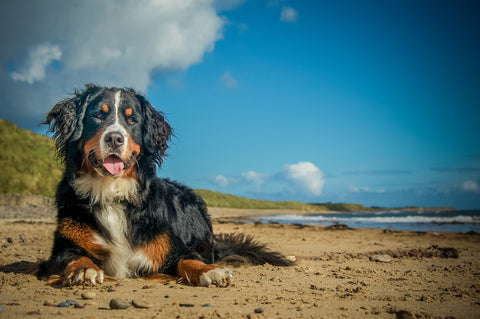 Origin: Bernese Mountain Dogs’ names suggest their origins, though it may be lost on many American dog owners. This canine breed originated in Switzerland, specifically in the city of Berne after which the breed is named. Their original name, Berner Sennenhund, translates literally to ‘Bernese Alpine herdsman's dog.’
Origin: Bernese Mountain Dogs’ names suggest their origins, though it may be lost on many American dog owners. This canine breed originated in Switzerland, specifically in the city of Berne after which the breed is named. Their original name, Berner Sennenhund, translates literally to ‘Bernese Alpine herdsman's dog.’
Beginning in the late seventeenth century, BMDs were originally bred from Roman Mastiffs, large bullish canines who were used in dogfighting and hunting practices for centuries. Exhibiting excellent skill in guarding and all sorts of farm work, Berneses were ‘all-purpose’ canines for the majority of their early decades. Mainly, they used their immense strength to pull heavy carts and loads over dangerous mountain passes. This incredible skill made them invaluable on farms and ranches, where they would live out the rest of the nineteenth century.
By the early 1900s, BMDs were shown in dog shows, and breeders quickly founded the Schweizerische Dürrbach-Klub, or the Swiss Bernese Dog Club. This would be the foundation for decades of popularity and hundreds of canines born into loving homes and exciting farms.
History: Once solidified as an established European canine breed, the Bernese Mountain Dog numbers swelled into the dozens over the next few years. By 1910, there were 107 BMDs registered in Europe, and the ranks would only grow as the breed traveled to the United States in the 1930s. In the same decade, the American Kennel Club recognized the breed in its working group. Breeders, farmers, ranchers, and even families adopted these intelligent dogs for working, guarding, and companionship all over the western world. They lived happy and active lives throughout the twentieth century, after which they would rank in the top thirty most popular breeds according to the AKC in 2013. Today, Bernese Mountain Dogs can be found working on farms and ranches, guarding livestock, and living in homes with loving families.
Breed Attributes
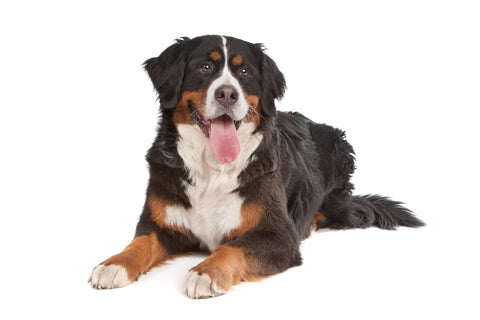 Temperament: Bernese Mountain Dogs are generally quite laid-back dogs, and it would not be a stretch to call one a couch potato. However, these canines also enjoy and require a fair amount of exercise every day to stay mentally and physically fit. When outside, they will likely explore, greet new friends, and play with pulling toys. When they’re inside, they can usually be found curling up on the couch or napping in the shade.
Temperament: Bernese Mountain Dogs are generally quite laid-back dogs, and it would not be a stretch to call one a couch potato. However, these canines also enjoy and require a fair amount of exercise every day to stay mentally and physically fit. When outside, they will likely explore, greet new friends, and play with pulling toys. When they’re inside, they can usually be found curling up on the couch or napping in the shade.
They are also known to be friendly and affectionate, so be prepared for slobbery kisses and lots of fur in your face. Their breed standard claims a certain openness to strangers, including other dogs, so BMDs often enjoy a trip to the dog park or the pet store. Obedience training is essential for large dogs, as they often don’t realize their strength, so be sure to train your dog as early as you can.
Personality: Bernese Mountain Dogs are most often referred to as “docile” or “good-natured,” for very good reason. These canines are sweet and social, often enjoying dog parks and outdoor walks where they can explore and meet new friends. While every dog is different, you can count on a Bernese to be generally gentle and loyal.
Ideal Owner: You! Bernese Mountain Dogs will need a lot from their owner, but they’ll repay you with endless love and loyalty. If you enjoy warm cuddles, long walks, and plenty of play time, a Bernese is the dog for you.
Fur Care
 Grooming: A BMD’s thick coat is surprisingly easy to take care of; the straight texture can be groomed with a thick bristled brush, which helps remove loose fur and stimulate blood flow to the skin. Twice a year, typically in spring and autumn, most alpine canine breeds, including Bernese, molt or shed profusely, but there are a few ways to manage the shedding. Veterinarians often recommend an omega 3 supplement for dogs who shed excessively, as deficiency in this nutrient is linked to dry, irritated skin and fur loss. As well, a nourishing shampoo can help remove loose fur and nourish the skin.
Grooming: A BMD’s thick coat is surprisingly easy to take care of; the straight texture can be groomed with a thick bristled brush, which helps remove loose fur and stimulate blood flow to the skin. Twice a year, typically in spring and autumn, most alpine canine breeds, including Bernese, molt or shed profusely, but there are a few ways to manage the shedding. Veterinarians often recommend an omega 3 supplement for dogs who shed excessively, as deficiency in this nutrient is linked to dry, irritated skin and fur loss. As well, a nourishing shampoo can help remove loose fur and nourish the skin.
Veterinarians and groomers also recommend getting your BMD accustomed to grooming at a young age. Even a small Bernese Mountain Dog puppy can cause a ruckus in the bath, but training and routine can help them stay calm. If your dog is not a fan of water, try our Bernese Mountain Dog Groovy and Mellow Shampoo for calming effects in an effective shampoo formula.
Berneses tend to drool as well, which can be cleaned up with a refreshing grooming wipe. These wipes help keep skin and fur clean by removing dirt, debris, mucus, and drool.
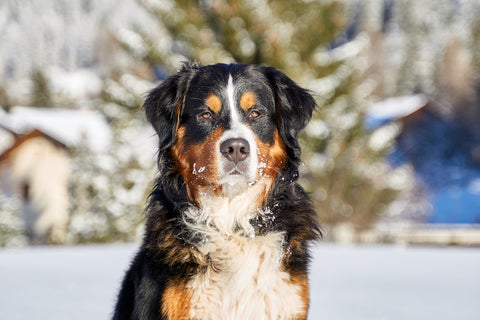
Shedding: Thanks to their mountain-dwelling ancestors, Berneses have thick fur that sheds heavily when they don’t need the extra warmth. Therefore, spring and summer are high-shed times during which your vacuum will be working overtime.
One factor that contributes to shedding is skin hydration; dry skin can cause itching, irritation, inflammation, and fur loss. To help keep skin moisturized and healthy, veterinarians recommend a nourishing oatmeal shampoo as it is full of nutrients and proteins that dry skin needs. Another factor is nutrition, which is explained further below.
Colors: Brown, black, and white
More to Know: A full-grown Bernese Mountain Dog can pull weights up to 1,000 pounds.
Health
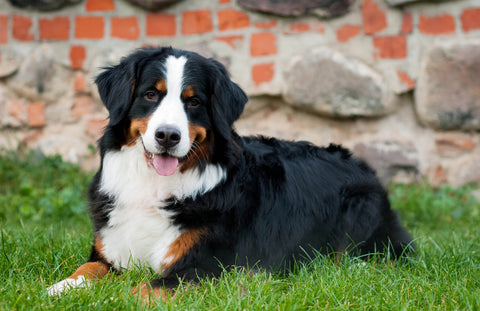 Common Issues: Thanks to responsible breeding practices from their beginnings, Bernese Mountain Dogs are generally healthy canines. Regular veterinarian visits, a healthy diet, and plenty of exercise all contribute to your dog’s longevity and quality of life, and there are a few predispositions to health issues that BMD owners should be aware of.
Common Issues: Thanks to responsible breeding practices from their beginnings, Bernese Mountain Dogs are generally healthy canines. Regular veterinarian visits, a healthy diet, and plenty of exercise all contribute to your dog’s longevity and quality of life, and there are a few predispositions to health issues that BMD owners should be aware of.
Cancer is a concern for all dogs, but BMDs have a higher genetic risk of fatal cancers such as lymphosarcoma, fibrosarcoma, and osteosarcoma. For this reason, it is crucial to schedule regular veterinarian visits and ask your vet about their risk factors.
Von Willebrand Disease is another concern for Bernese puppies and dogs. This inherited bleeding disorder is caused by a lack of Willebrand factor in the blood, which is an essential aspect of normal blood clotting. Willebrand’s may not present in your dog’s puppy years, so it is recommended to ask your vet about their risk and possible testing.
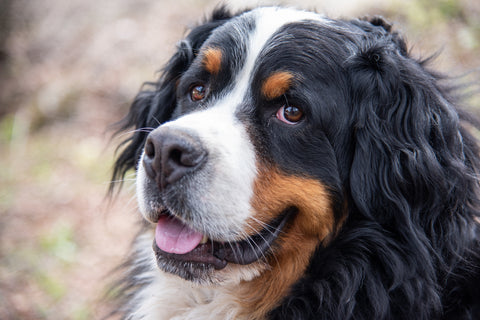
This breed is also prone to musculoskeletal concerns, such as arthritis, hip dysplasia, and ligament rupture. These and other health concerns can present at younger ages than in other breeds, likely due to the size of the average Bernese. Veterinarians often recommend a daily multivitamin and a joint support supplement for ongoing joint and muscle care at all ages. These supplements replenish essential nutrients such as Glucosamine and Chondroitin to promote the natural healing and rebuilding process.
Possibly linked to their size, Bernese Mountain Dog life expectancy sits at around seven to nine years. Any dog, regardless of their genetics, has potential for a long, happy, healthy life. Home and veterinary health care are crucial parts of your dog’s quality of life. Be sure to ask your vet about your dog’s health risks and wellness needs.
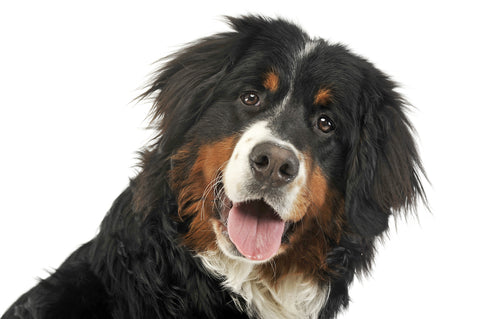 Nutrition: All dogs need ample protein and vitamins in their diet, especially large active dogs like BMDs. Their food should be based in meats such as poultry, beef, and pork. Many veterinary nutritionists recommend a canine multivitamin for a boost of vitamins and minerals every day. A Bernese Mountain Dog weight may mean they need large amounts of vitamins every day, so be sure to check their weight for accurate dosing.
Nutrition: All dogs need ample protein and vitamins in their diet, especially large active dogs like BMDs. Their food should be based in meats such as poultry, beef, and pork. Many veterinary nutritionists recommend a canine multivitamin for a boost of vitamins and minerals every day. A Bernese Mountain Dog weight may mean they need large amounts of vitamins every day, so be sure to check their weight for accurate dosing.
Supplementation compliments but does not replace a healthy, balanced diet. Rather, veterinarians recommend multivitamins and supplements to help fill the gap left by commercial dog food, which is often low in essential nutrients such as vitamin E. Giving your dog a multivitamin is a fantastic first step towards achieving optimal health.
Lifespan: 7-9 years
Physical Activity
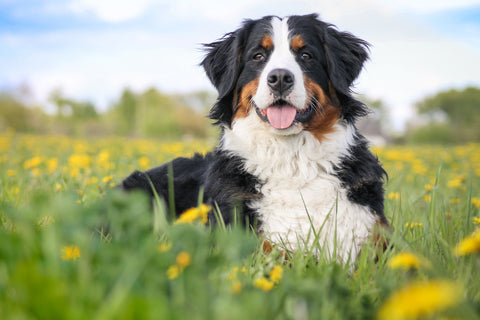 Training: Bernese Mountain Dogs have been working canines since the beginning, and they are still highly intelligent and trainable. Early obedience training is key for any dog, as it helps them feel comfortable and confident as well as teaches them to follow your command. Because of their history as working canines, Berneses can be trained to fulfill helpful tasks that include pulling, carrying, and guarding. For more information on training your Bernese as a worker, we recommend checking out any of these fine organizations specifically dedicated to BMDs: Bernese Mountain Dog Club of America, Bernese Mountain Dog Info, and BFW Rescue.
Training: Bernese Mountain Dogs have been working canines since the beginning, and they are still highly intelligent and trainable. Early obedience training is key for any dog, as it helps them feel comfortable and confident as well as teaches them to follow your command. Because of their history as working canines, Berneses can be trained to fulfill helpful tasks that include pulling, carrying, and guarding. For more information on training your Bernese as a worker, we recommend checking out any of these fine organizations specifically dedicated to BMDs: Bernese Mountain Dog Club of America, Bernese Mountain Dog Info, and BFW Rescue.
Exercise: In spite of their size, Berneses love to play outside and often enjoy tough toys such as pull ropes. They have been bred as working dogs for decades, so their instincts often lead them to explore their surroundings, guard their pack, and most importantly, feel useful. Praise and rewards for a job well done are always appreciated by a Bernese.
Their instinct to play is strong, but their drive to run is not quite as strong. Their large, muscular bodies are built for strength, but not necessarily speed or agility. Your Bernese will more likely enjoy a brisk walk outside with you than running circles in the backyard, but your dog will show you what they like. Listen to their body language and make sure they have access to space and toys.

The Bernese Mountain Dog has a long history of work behind it, and a bright future before it. As one of the most popular canine breeds in the US, these dogs are both beloved and appreciated all over the western world.

